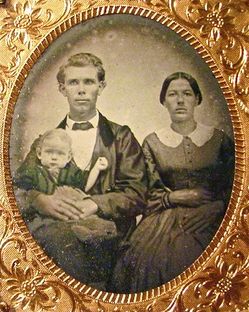Almost Christian: Was America more religious in the past?
Editor's note: This is the third in a series this week by Dr. Baker about the book "Almost Christian" by Kenda Creasy Dean. Go to Our Values to read the earlier posts in this series.

Portrait of an American family, 1800s.
Photo from Wikimedia Commons.
The thesis of this hot new book is that American teens today have embraced a caricature of Christianity, not the real thing. For them, Christianity is like soft-serve ice cream, the central aim in life is to be happy, and God is a "Mr. Fix-It."
The implicit comparison is to a version of the past where American Christians embraced a tougher, more demanding, and more “other”-focused version of religion.
My question is: To what extent is this a true image of the past?
I could cite facts and figures about religion in America’s past, but what really comes to mind is my great-grandfather, James Baker. I have only two pictures of him, one taken when he was married, the other later in life. In the second picture, he is sitting on the porch of his cabin in the Appalachian backcountry. He is wearing a suit and holding a book. The book is held in such a way that he clearly intended us to see what it was. The title: Holy Bible. I’m told that he was very proud of this picture.
I know little about him, but I do know this: If he took Pew’s online quiz on religious knowledge, he would have scored a perfect zero. Why? He was illiterate. He couldn’t even write his own name. He signed his marriage certificate and other legal documents with his mark, an “X.”
So, was he religious or not?
Unless he had a prodigious memory and regularly attended church, his factual knowledge of Christianity was probably low. If religious knowledge is the measure of religiosity, he wasn’t very religious. We’ll never know how religious he really was, but his story raises a question: How much factual knowledge is necessary for a relationship with God? Or, conversely, is rich factual knowledge always an indicator of strength of religion?
We know the answer to the second question from a Pew’s survey. Atheists and agnostics score high on the quiz, despite their questioning of God’s existence.
The second question is the crux of the American experience with religion. Ever since Anne Hutchinson was banished from the Massachusetts Bay Colony for her controversial views on religious experience, Americans have wrestled with the question of whether it’s possible to have an unmediated, personal relationship with God.
What’s your view of religion in the past?
Is American Christianity a weak version of its former muscular self?
Dr. Wayne E. Baker is a sociologist on the senior faculty of the University of Michigan Ross School of Business. Dr. Baker blogs daily at Our Values and can be reached at ourvaluesproject@gmail.com.


Comments
Forever27
Mon, Oct 11, 2010 : 1:37 p.m.
How convenient that religion becomes an abstract concept when the doctrinal views of its history are questioned/proven ridiculous. If someone claims to have a religious belief, they better know what that belief really is. Otherwise, they're not believing it, they're simply doing what their told and believing what they're told to believe. This is not a good way to come about a personal opinion on the base for all existence.